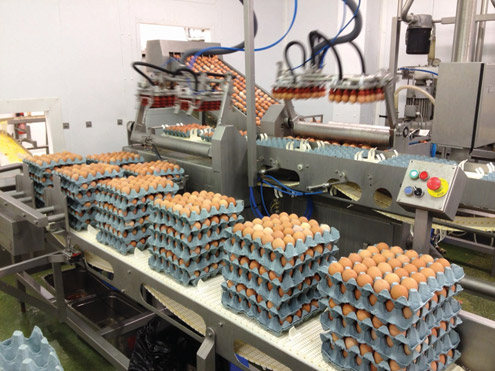Partnership approach to liquid egg business

In 2009, with the conventional cage ban approaching, bosses at a Nottingham bakery wanted to secure a supply of liquid eggs – a key ingredient in its products.
“We wanted to take the uncertainty out of the market and guarantee a sustainable supply,” said Paul Denney, head of purchasing at Pork Farms.
Approaching supply chain consultant EFFP (European Food and Farming Partnerships), the company was looking for a collaborative alternative to its existing supply chain and needed egg producers and an egg processor.
“We identified egg producers in Yorkshire with the right mindset and developed a cost of production model (COP) with them,” said Paul Rhodes from EFFP.
Marketing co-op EggSell, based in Beverley, East Yorkshire, was a newly formed group of more than 25 egg producers that was already working with EFFP and looking for the chance to work more closely with customers.
“We had worked with EFFP before as they’d helped set up the group and they knew we were looking for a long-term trade relationship,” said Barry Jackson, chief executive of EggSell.
The main benefit for egg producers, according to Mr Jackson, is the stability and longevity of the relationship, which doesn’t exist in traditional supply chains. “We wanted to be able to plan two or three years in advance.”
EFFP facilitated discussions to align their individual objectives, develop commercial ways of working and start to form a relationship.
Processor required
The second part of the collaboration was finding a processor that could turn the shell egg from EggSell into the liquid egg that was required by Pork Farms.
EFFP looked at a number of processors, but the important detail was to find a company interested in working collaboratively with the necessary accreditations to meet Pork Farm’s requirements.
A quarter of egg in the UK is used as processed product, so there was no shortage of potential suppliers, but EFFP identified family business Bumble Hole Foods, in Bromsgrove, Worcestershire, as the perfect partner.
“They had a positive attitude, were well set up, willing to invest and open to discuss working in a different way from the norm,” said Mr Rhodes.
The importance of having a different customer base was what attracted Bumble Hole to the partnership, according to managing director Andrew Hewston.
“We wanted to give farmers more stability with a fixed price based on cost of production. Markets in the past were very limited, but the partnership gives farmers the opportunity to add value to their product and look at the long term, particularly with fluctuations in egg prices.”
Cost model
EFFP then developed the COP model for processing as well as production, creating transparency in the supply chain. This was an essential tool to help facilitate the development of the eventual egg supply contract.
“We were breaking new ground in forming this partnership,” said Mr Rhodes. “Building the relationship took months and getting an agreement from all three parties was challenging.
“We started by creating a sophisticated model and used it as a basis for price negotiations. One of the things we brought to negotiations was managing expectations and needs, while getting each party to see the others’ sides.”
It was important to have an independent referee to help broker discussions.
The initial agreement for part of Pork Farms liquid egg requirements was signed in spring 2010. This was just the start as, to further build the volume, all parties had to “prove themselves”.
The chain operated successfully and Pork Farms was soon keen to increase the 10,000 litres of liquid egg a week procured under the agreement.
The partnership received help via a DEFRA project, which recruited additional farmers for EggSell and helped Bumble Hole receive the required retailer accreditation.
“Our business has evolved a lot. We’ve employed people with more food experience and invested £8m in capital expenditure,” said Bumble Hole’s Mr Hewston.
With all these elements in place, the partnership now supplies all Pork Farms £3.2m liquid egg requirements – around 25,000 litres a week.
“This three-way relationship is working well and has formed a sound platform for developing other added-value and cost-saving initiatives,” said Mr Rhodes.
